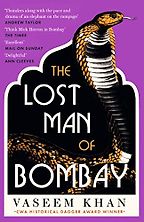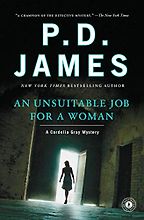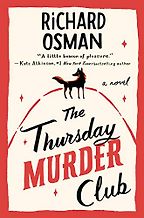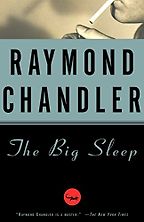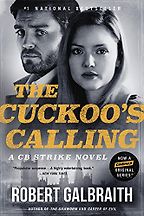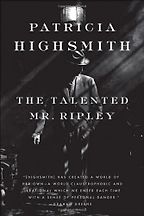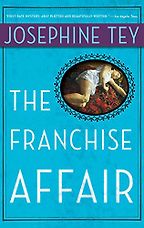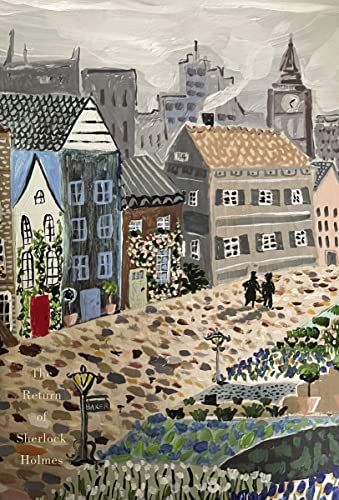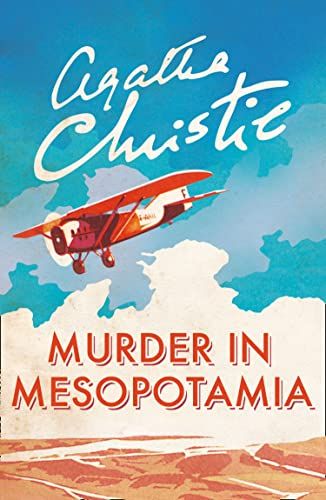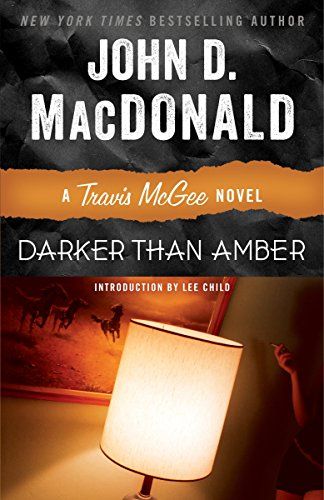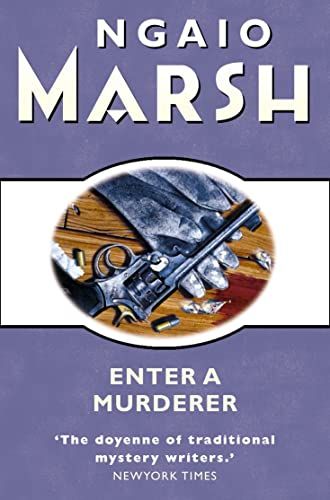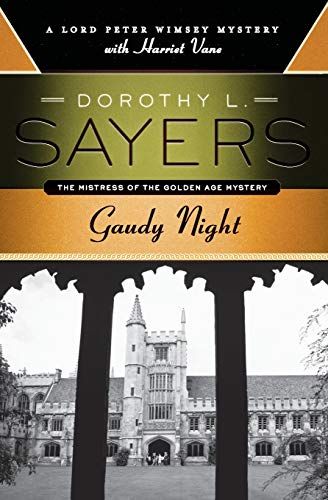Mystery Book Series
Last updated: March 18, 2025
The Lost Man of Bombay
by Vaseem Khan
☆ Shortlisted for the 2022 CWA Gold Dagger
The Lost Man of Bombay is the third book in Vaseem Khan's Malabar House series, a set of historical mysteries set in post-independence India. It has echoes of Seven Years in Tibet as well as Mick Herron's Slough House series. The main protagonist is Persis, the first and only female detective to have qualified for the Indian Police Service.
“This is the first of the Cordelia Gray series, who is a very tough, very intelligent, frankly, a very P.D. James woman. I mean, she could have been writing about herself. Cordelia Gray takes over the Pryde detective agency on the death of her boss and has to run it. This is the first case she comes across. She’s asked to investigate the death of a young student in Cambridge. P.D. James lived in Cambridge, so she knows it backwards. The father of the student is a distinguished professor and considers it suicide. He asks her to wrap it up for him, but she delves into it and discovers it wasn’t a suicide… “ Read more...
Jeffrey Archer, Novelist
“What’s not to love? Four 70-somethings living in the same retirement village meet every Thursday in the Jigsaw Room to discuss unsolved crimes—until a local developer turns up dead and the Thursday Murder Club confronts their first ‘live’ case. The entire scenario and cast is delicious. Lots of narratives are witty and worth a sardonic smile here and there, but The Thursday Murder Club is funny, compassionate, and completely entertaining—an utter treat to read.” Read more...
Tosca Lee, Novelist
“Chandler is the daddy of Noir. When I was first thinking about writing crime, I decided to go back and read the classics that I hadn’t read already. The tone reminded me a lot of those old movies, and it helped get me a sense of the aesthetic of my own writing of that period. I have American characters in both of my last two books. I was trying to figure out how to write their dialogue. And I think that Chandler’s dialogue is really good—you can hear it just as it might be spoken.” Read more...
Louise Hare, Novelist
The Cuckoo's Calling
by Robert Galbraith
The Cuckoo's Calling introduces Robert Galbraith/J.K. Rowling's detective Cormoran Strike. How does he compare to other literary detectives? In our experience, there are (broadly) two types of literary detective. The first type are patently ludicrous, but a lot of fun. Sherlock Holmes and Hercule Poirot are among the best known examples, but Simon Brett's Charles Paris or MC Beaton's Agatha Raisin are also wonderfully ridiculous detectives. The second type aim to be 'real' characters. We are still expected to suspend disbelief, but there's a basic aim to make a believable character we can identify with. In that aim, crime novelists rarely succeed. One detective might like jazz, another poetry, but they're pretty generic. Not so Cormoran Strike. He is a memorable detective, with a character that sticks with you (in our mind, he looks like the actor Robbie Coltrane).
As the first in the series, The Cuckoo's Calling is one of the best, also introducing Robin Ellacott, the Yorkshire woman who starts the book as Strike's temp. In the audiobook, actor Robert Glenister is excellent at narrating her Yorkshire accent and, like Strike, she seems like a real person.
“The idea that you want him to succeed even though he’s a psychopath is a real feat of literary genius. Because if anyone put that in a synopsis, you’d think, ‘That’s not going to work.’ Even though every part of your moral consciousness is telling you that it’s wrong, there you are thinking, ‘I want you to get away with this, I want it to go your way.’ To get us, as the reader, to empathize with somebody who is such a horrific, damaged person is just such brilliant writing.” Read more...
“This book is just so well crafted. Everything seems to be building up against the two women, that it looks as if they really did kidnap this girl, and keep her locked in the attic – and how on earth are they going to get out of it? It’s just very, very well done. The Daughter of Time was a classic, where her detective goes out to prove that Richard III didn’t kill the Princes in the Tower, but The Franchise Affair remains my favourite. It’s just lovely writing.” Read more...
Mysteries and Other Favourite Books
M C Beaton, Thriller and Crime Writer
“I could have picked the first Sherlock Holmes collection as well. I could have picked The Hound of the Baskervilles, which is brilliant. I could’ve picked anything Sherlock Holmes. But if someone said to me, ‘You can only reread one Sherlock Holmes story’ that first story in The Return would be the one for me. It’s both a brilliant locked-room mystery and you have Holmes returning. It’s great.” Read more...
Stig Abell, Journalist
“A lot of people love the later Christie, I like the early ones. This one is from 1936. It’s set at an archaeological dig. There’s a plan of the dig and where everyone’s rooms are. I don’t want to ruin it for anybody, but it’s quite a neat solution. It’s a good problem-solving one…It’s a good setting. It’s a finite group of people who are suspects. I like the way it’s written. Her framing devices are really good—there’s not just a straightforward narrator. I love Hercule Poirot more than Miss Marple. I think Poirot is a more interesting figure. And I do have a fondness for the dramatic resolution. The ‘I’ve gathered you all in the room together and this is when I point the finger at the person who did it.’ The neatness of it is really appealing.” Read more...
Stig Abell, Journalist
“The conceit behind the central character is magnificent. He’s called Travis McGee and lives in a boat called the Busted Flush in Florida. He wants to have his retirement while he’s still young enough to enjoy it. He’s this charming knight errant. People who have things stolen from them, who can’t get legal recourse, come to him. He says, ‘I’ll get it back for you, but I’ll take half the value.’ That’s how he earns money, and that enables him to live this beach bum lifestyle. Each book has a colour in the title and each one is an attempt to recover something. He’s an environmentalist, which has dated well. He’s constantly bemoaning the building up of the Everglades and environmental pollution in Florida. His best friend, who helps him in Darker than Amber, is called Meyer and lives on a boat called the John Maynard Keynes.” Read more...
Stig Abell, Journalist
“I’d never read Ngaio Marsh at all until about a year ago. Her inspector is brilliant. He’s called Roderick Alleyn. He’s very wry. He’s highly educated and is constantly quoting Shakespeare. He’s got a lovely relationship with his colleagues in Scotland Yard. Ngaio Marsh had a lot of experience in the theatre, so quite a lot of her novels are set there, including this one. She’s very good on what actors were like in the 1920s and 30s. They were horrors, many of them. The idea of the awful luvvie is brilliant in these books.” Read more...
Stig Abell, Journalist
“Gaudy Night is a beautiful love story. I love the relationship between Peter Wimsey and Harriet Vane. I just think it’s magnificent. I love the fact that he’s this damaged man who some people dismiss as a posh twit. He suffered during the First World War, he has post-traumatic stress syndrome, and is in love with this woman who he once saved from being hanged for murder in an earlier book. It’s part of a series and that’s important. The setting in Oxford is brilliantly done. It’s charming. It’s very restful in parts. Nothing that bad happens for large chunks of it, so it’s quite soothing in that regard. All these things together epitomize what I love in the crime genre.” Read more...
Stig Abell, Journalist
The Best Classic Crime, recommended by Stig Abell
The crime book genre is massive and caters to all sorts of tastes, but once you find a detective or main character you love, there are few pleasures greater than reading the entire series. British journalist Stig Abell, author of Death Under a Little Sky, picks some of the best classic crime, books he’s read over and over again.
